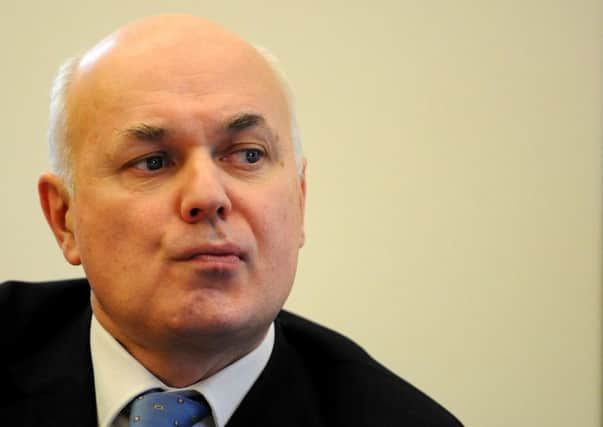Part-time workers ‘may face benefit sanctions’


Mr Duncan Smith said that pilots being carried out in the North West of England had found that employers were more ready to take on UC claimants than those on the old-style Jobseeker’s Allowance (JSA) because it was easier to extend their hours as more work became available.
He told the House of Commons Work and Pensions Committee that trials were being conducted on removing in-work benefits from those who reject additional hours under a system known as “in-work conditionality”.
Advertisement
Hide AdAdvertisement
Hide AdThe Work and Pensions Secretary dismissed an accusation by Labour committee member Debbie Abrahams that people were dying as a result of having benefits withdrawn because they were deemed not to be looking hard enough for work.
He told her sanctions had played a vital role in reducing unemployment numbers by “helping people focus on what they are doing”.
Ms Abrahams asked: “Can you confirm that there is an intention to introduce in-work conditionality with Universal Credit and, if so, what sanctions could be applied, and under what conditions to the 3.5 million people in work on low pay and in receipt of tax credits?”
Mr Duncan Smith replied: “That is being investigated, as to whether we can now work to in-work sanctions – in other words, conditionality – so people get an opportunity to move up the hours if they can, and if they don’t wish to do that, we will see whether or not that system of conditionality works. We are trialling that.”
Advertisement
Hide AdAdvertisement
Hide AdUniversal Credit will replace six benefits, including JSA, income support, child tax credit and housing benefit, but its national roll-out has been delayed.
So far, about 26,000 claimants – mostly single people – have applied in parts of the North West and Hammersmith in west London, with the scheme to be extended nationally from February and finally completed by the end of 2018.
Mr Duncan Smith insisted that, rather than costing money, it had reduced the one-off bill for the changeover to £1.8 billion, from an initially-projected £2.4 billion.
He said early studies of its impact in the North West suggested UC claimants were finding work more quickly and staying in employment for longer, resulting in “early savings to the Exchequer” from reductions in the benefits bill.
Advertisement
Hide AdAdvertisement
Hide AdDiscussions with firms including DIY chain B&Q had found that the switch to UC made part-timers more willing to take on extra work, because they do not face the current system’s “cliff-edge” withdrawal of benefits at 16 hours.
This, in turn, made employers more willing to hire them. Normally in a business, a job doesn’t stay static at 16 hours – you want it to develop,” Mr Duncan Smith told the committee.
“Businesses know that many people will not work more than 16 hours because they don’t think it is viable for them to do so because of all the withdrawals.
“What we are beginning to experience in areas of the North West is they can now work to progress that individual and set training programmes around them, so it is worth investing in that individual to develop their own skills and their own productivity.
“In the North West, many businesses are now asking to have people on Universal Credit to come and take interviews, because they know they can develop them all the way through.”